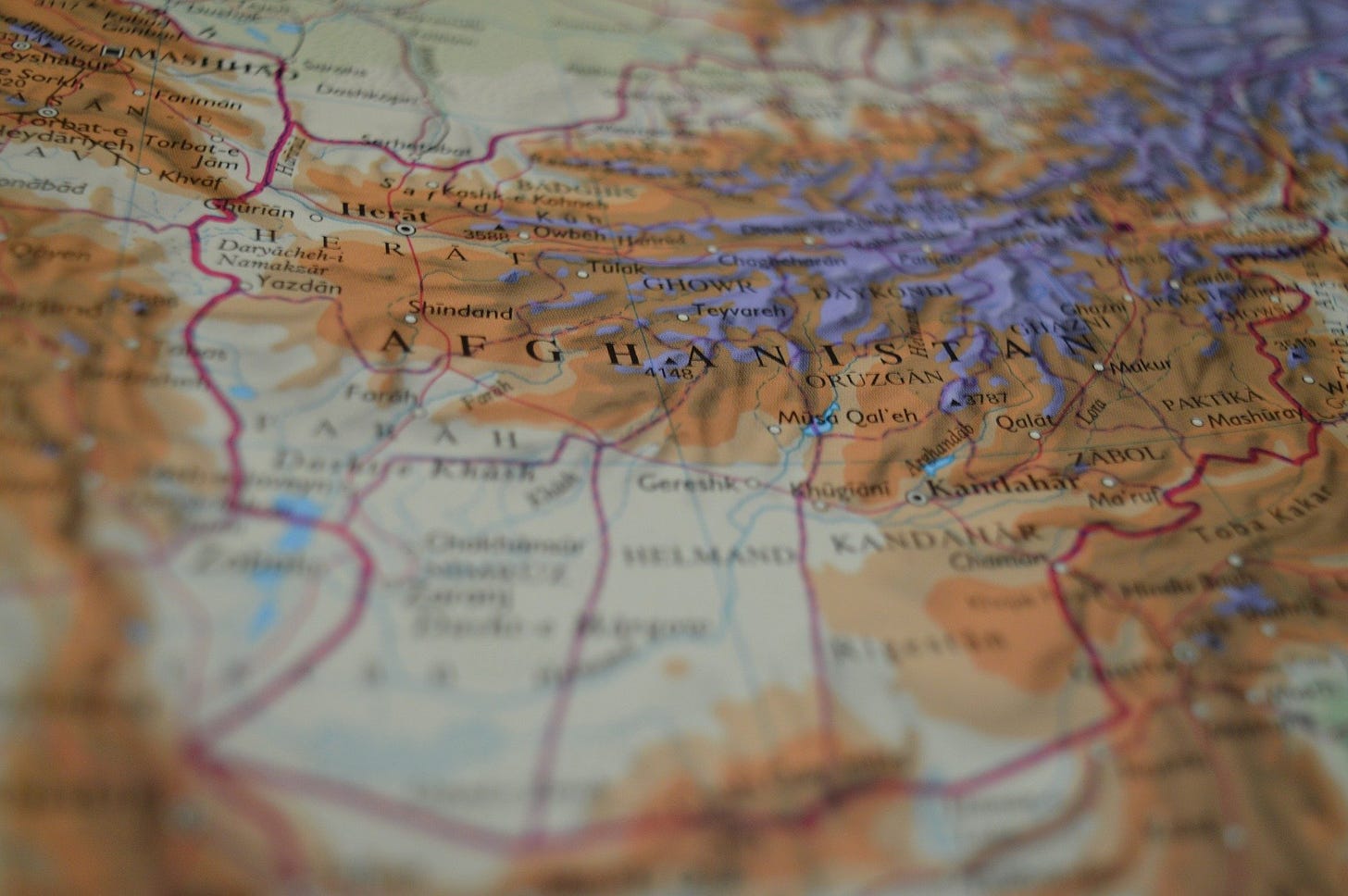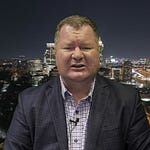This is the transcript from my radio interview with Latham Saddler. You can get more exclusive content by subscribing below for $7/month or $70/year.
Erick:
Now look, I've got to caveat this one coming out of the gate here because I've got a guest on with me. He's also a candidate for office, and I know how this works. I put a candidate for office on and every other candidate running for that office is like my turn, my turn, my turn. No, the hell it's not. It's my show, and I have someone on not to talk about politics and campaigns, but to talk about his background.
He was active duty in Afghanistan and Iraq. He worked as a Director of Intelligence programs on the National Security Council in the Trump administration. He joined the Seals after 9-11, and I want to talk to him about that experience in Afghanistan. His name is Latham Saddler, a candidate for the U.S. Senate in Georgia. Welcome to the program.
Latham Saddler:
Erick, Thank you so much. It's an honor to be on the show here today.
Erick:
Now I will violate my opening here and ask you one thing because the Atlanta Journal-Constitution has a hit job out on you today that in 2004, in the Presidential campaign, you ventured into a Democratic Presidential primary in North Carolina. If I recall right, that was the year Rush Limbaugh was telling conservatives they should go in and try to keep Howard Dean alive.
Latham Saddler:
Yeah, that's right. I woke up this morning and saw that and considered that a badge of honor that my opponents are scraping the bottom of the barrel of the object to try and take me down with the fact that as a teenager, I once thought I was a Democrat and then quickly learned about the world. And that was due to a lack of real-world experiences.
And then in 2004, I could not stand John Kerry. So it was an honor to vote against him twice. As you know, we didn't have a Presidential primary since George W. Bush was running for re-election, so voted in the rest of the Republican primaries, but I took an opportunity to aim at John Kerry twice. And I sure as heck am not ashamed of that.
Erick:
Good for you. Man, that guy... Now let's talk about your experience. First of all, how did you get into the military?
Latham Saddler:
So look, I was up at the University of Georgia having the time of my life and 9-11 happened. It changed all of our lives forever, certainly changed mine, Erick. I didn't have plans to join the military, and a switch went off on that day for me. And I ended up on a long journey to becoming a Navy Seal and ended up living in the region of central Asia for a full academic year while I was learning the Persian language of Farsi and Dari.
I lived in Tajikistan, and gosh, this week has been a heartbreaker for me because it's close to home. I backpacked through Afghanistan back in 2009 when I was over there and then later deployed there as a Navy Seal with my brothers and sisters in the teams. And I'm fluent in the language, and so this week has been pretty jarring for all of us, and it certainly has for me as well.
Erick:
Before we get into Afghanistan let me ask you, just given your background there and the people you keep into contact with, the mental health issue of those who fought, lost colleagues there, seen what President Biden is doing, and the chaos after the long-fought war. I don't know if you were listening earlier. I played the audio of a British member of Parliament who said it wasn't a never-ending war. It was a never-ending peace if we had maintained it. It was a war to get to that peace, and we've squandered the peace. And really just your thoughts on the strain, the taxing strain on mental health that's got to be for the soldiers.
Latham Saddler:
Yeah, I'm very concerned about that, Erick. I mean, obviously a lot of folks that experienced combat over there struggle with mental issues, and I think for anybody, whether you do or not, to see how everything was thrown away after 20 years, it's heartbreaking. I mean, it really is.
And look, I'll tell you, Erick, I fall in the category of, I don't believe in perpetual foreign wars without an end state. I think that there are a lot of lessons learned that need to come from this, but the way this was done, I mean, there were multiple options. I mean, whether it was a limited footprint within the country, a footprint without to give us the same capability to prevent another 9-11. And it's how this was done that is just such a heartbreaker. And the fact that it's going to put a forever stain on our entire country due to just a complete lack of leadership at the top and poor execution on the ground. It's just, it's very troublesome.
Erick:
Now tell me, John King was on the other day, Major General, and also now Georgia Insurance Commissioner, talked about the number of people who have reached out to him via WhatsApp from Afghanistan, just trying to get their kids out of the situation, not themselves. I assume you've got similar contacts over there. Are you talking to anyone, or what are you hearing?
Latham Saddler:
Yeah, I'm talking to a few folks. I've had a bunch of folks reach out to me in that capacity and getting my thoughts on the matter. Just given that I've got kind of a unique, multiple unique lenses to view this situation through. I mean, number one, Erick, I'm gravely concerned about the number of Americans that are still over there. It's very concerning that we could end up with the largest hostage crisis that our country has ever seen due to just an entire lack of planning and execution on the ground.
And then of course, I think about the Afghans that hosted me so graciously when I was a graduate student backpacking through the region, and they talked about their experiences during the Taliban era and the atrocities that they experienced and how much they enjoyed their freedom.
And then of course the Afghans that we fought with over there in Afghanistan. I mean, all these folks' lives are in jeopardy, and it didn't have to be this way. So it's just rough to watch, man. It's a heartbreaker for sure.
Erick:
Now for awhile you were with the National Security Council for President Trump. I know he wanted to get out of Afghanistan and ultimately gave the order to wind down. What was it like being in the National Security Council for President Trump at the time?
Latham Saddler:
Yeah. So look, for me, I was there the first two and a half years of the Administration. The first year and a half of that was while I was still in the Navy on active duty, as you mentioned on the National Security Council. And then I was a White House Fellow working on domestic policy issues for an additional year.
And I'll tell you on the national security front especially, it was an honor to do the work that we did. I mean, we put our adversaries on their heels. They felt the strength emanating out of America, and I had experienced the opposite of that, Erick. In 2015, I led a 25 person element in Iraq. Interestingly, it was the same time that our current Secretary of Defense was CENTCOM Commander. I was not impressed by him then. And we had our hands tied. I mean, we were not allowed to do much in 2015 because of micromanagement out of the White House from folks that just had no idea what was going on on the ground.
And I promised myself after that experience, Erick, if I ever have the opportunity to serve on the National Security Council staff, I'm going to do it. And I'm going to reverse that way of doing business. And I'll tell you, we empowered the inner agency, the Department of Defense and the intelligence community, the State Department to do their jobs because they're the experts. But we were also very thoughtful about everything we did. We'd ask ourselves four questions when it came to any critical decision in our activities overseas, Erick. We asked ourselves, what is the end state? How much does it cost? How long will it take? And who else can do this with us or without us?
And there were a bunch of people up there, Erick, that had the experience on the ground. And when you look at the cast of characters that are in the White House right now, it's no wonder that they didn't even think through the fact that there's a fighting season in Afghanistan that starts in the spring and goes through the summer. And the fact that they announced this in the spring and then pull the plug at the height of fighting season and then act surprised when the Taliban takes over the country, I mean it just shows you the type of folks that are up there making critical decisions on behalf of our country.
Erick:
Now let me bring some politics into this. You're running against Raphael Warnock. Well, first you've got to make it through a Republican primary in Georgia to go up against Raphael Warnock. John King, the Georgia Insurance Commissioner, said Tom Cotton from Arkansas, who is a veteran, was actively trying to help John King's contacts, but Warnock and Ossoff are nowhere to be seen and not returning phone calls.
And in fact, I've tried to find any of their public statements and really can't find them saying anything about the Afghan situation right now. And look, here's your opportunity to chime in on them going into hiding like Kamala Harris.
Latham Saddler:
Yeah. I mean, it's unbelievable. And this underscores, Erick, why Georgia has always had a proud tradition of having national security experts in the United States Senate from our state. We had Richard B. Russell back in the day. We had Sam Nunn, who ensured we won the Cold War. We had Johnny, we had Saxy, we had David who all fought the good fight on these issues. And now for the first time, since World War II, we don't have a United States Senator on the Senate Armed Services Committee. And these folks have no idea about these issues. It's no wonder they're silent because if they spoke, I think they'd trip up.
And it's one of the reasons why I got into this race because, Erick, I got a firsthand view of our national security apparatus, both on one end of that spectrum, executing U.S. foreign policy on the ground with my brothers in the team, but then also at the decision-making table at the White House.
And I saw the blood and guts of our Pentagon as well as our intelligence community. And there's folks doing great work for the country, but they are in desperate need, Erick, of modern reforms for the way warfare has changed.
Somebody needs to get up there and do what Sam Nunn did in the '80s and '90s to reform those institutions and make sure that we're ready for any sort of war around the corner. And that's not happening. And the fascinating thing to learn at the White House, though, is whoever up the President of the United States is they don't have the power to make those institutional changes. The only way you can do that is on Capitol Hill in the Senate Armed Services Committee, the Senate Select Committee on Intelligence, and the Senate Appropriations Committee. They control the funding and the authorities, but those folks don't necessarily get the full picture that a handful of folks at the White House get, depending on where they're perched.
I'll tell you, Erick, I can not wait to get up there and make change because our country needs it. Georgia deserves to have a national security expert in the Senate. Georgia deserves to have somebody that actually has experience on these issues, both on the ground and at the national level of policymaking. And I tell folks, my wife is very concerned that I'm never going to sleep again because if I'm in that seat, I'm going to wake up at 4:00 AM, just ready to roar every day.
Erick:
Best of luck to you out on the campaign trail. And I really appreciate you stopping by and talking about your experience there. I know it's got to be taxing on you given what is now being given up there and your service to the country. So one, thank you for your service, and two, very much thank you for stopping by.
Latham Saddler:
Well, thank you for your kind words, Erick. Just know that you're worth it and the country's worth it. And this week has been rough indeed, but it just affirms even more that it was the right decision to jump in this arena to put country-first leaders back up in Washington to right the ship. So thank you. It's an honor to be on the show, and I look forward to meeting you in person.
Erick:
Yeah, me too. Thanks very much. Latham Saddler. He's a candidate for the United States Senate in the Republican primary in Georgia. He was a Navy Seal, backpacked through Afghanistan, learned the language. He's also one of those rare people who went to University of Georgia and Georgia Tech, undergrad at UGA and got his master's at Georgia Tech, and served for President Trump on the National Security Council.













Share this post